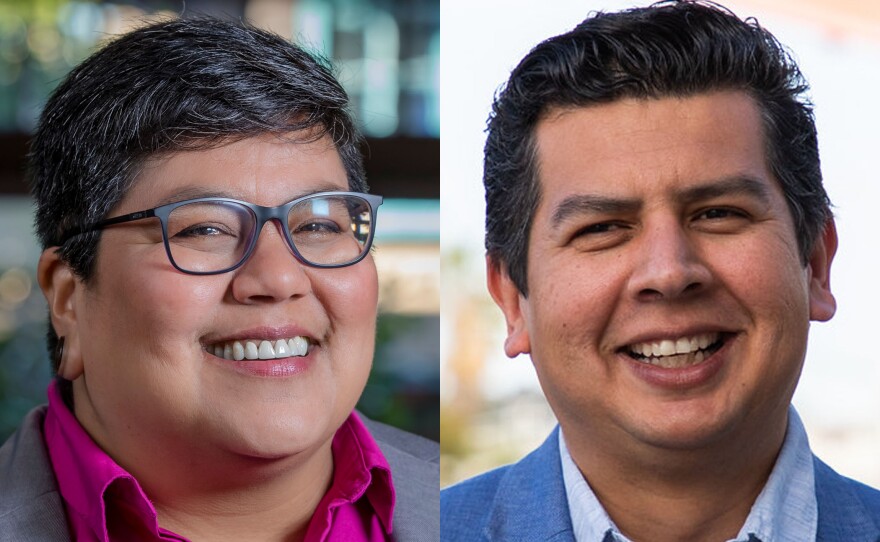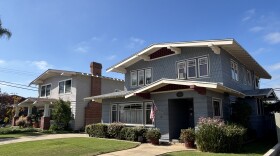The special election to fill the remaining months of former Assemblywoman Lorena Gonzalez's term will be decided in a runoff June 7.
David Alvarez led the field of three candidates with 38.42% of the vote, according to unofficial results released by the San Diego County Registrar of Voters Tuesday night which include all ballots cast at vote centers on Election Day.
Georgette Gómez, a second Democrat who was also a San Diego City Council member, was second with 36.98% of the vote.
RELATED: Live election results: Three candidates vying to complete Gonzalez’s Assembly term
The lone Republican in the race in the 80th Assembly District, retired contractor Lincoln Pickard, was third with 24.6% of the vote.
The next unofficial results update will be posted after 5 p.m. Thursday. There are a projected 6,500 ballots remaining to be counted, according to the San Diego County Registrar of Voters.
With no candidate receiving a majority, Alvarez and Gómez will meet in a runoff on the same day as a regular primary election for the full two-year term representing the redrawn district.
"We are excited to finish the night in first place and this is all thanks to the support we received," Alvarez tweeted.
"Since day one, we have prided ourselves in being a grassroots campaign and we have been out in our neighborhoods knocking on doors, talking and listening to the community every day and tonight is the reflection of all those efforts."
RELATED: California Legislature upended by new political maps
Wednesday afternoon, Alvarez told KPBS, “I feel really good with where we ended. The other campaigns were saying that we may not even make it into the runoff, so to come in first is definitely a boost of energy and excitement. But now we have two more months to talk to more voters.”
Gomez also spoke with KPBS Wednesday, saying, “I'm just very excited, I’m very tired and everything in between in terms of feelings. It's good to be where we are, we only think that it's going to get even better as the continuation of the count continues to move forward and I'm looking forward to June 7.”
On Tuesday evening, while waiting for the votes to be counted, Gómez said she was "excited that South County voters strongly supported our campaign tonight and I'm thrilled to be advancing to the runoff."
"As a community organizer, victims' advocate and City Council president during COVID, I've spent my life fighting for working families who deserve better and that's exactly who I'll stand up for in the state Assembly to expand affordable housing, reduce health care costs and protect our climate."
RELATED: Three candidates battle for South Bay in Assembly District 80 special election
The three candidates on the special election ballot are all on the primary ballot, seeking the two spots on the November general election ballot, along with Republican John Vogel Garcia, a technology manager.
Alvarez served on the council from 2010-18 and lost to Kevin Faulconer in the 2014 special mayoral election following the resignation of Bob Filner.
Alvarez was listed on the ballot as a small business owner. He started Causa Consulting after being termed out of his council seat and has served as member of the San Diego County Regional Airport Authority, San Diego Association of Governments and Metropolitan Transit System. He also served on the board of the League of Cities' Latino Caucus and the national Board of Local Progress.

Alvarez grew up in Barrio Logan and attended San Diego State University. His endorsements include San Diego City Councilwoman Vivian Moreno, National City Mayor Alejandra Sotelo-Solis and former state Sen. Denise Ducheny.
"I'm running for state Assembly because I'm worried about what kind of California we are leaving for our kids," Alvarez said in a statement.
"Our problems are getting worse, and the solutions provided by our leaders are ineffective. Sacramento politicians are out of touch with the problems families face every day. I'll confront our biggest problems head-on and pursue proven solutions."
RELATED: Why is so much special interest money flowing into a San Diego special election?
Gómez was a council member from 2016-2020 and lost a House race to Sara Jacobs in 2020.
She was listed on the ballot as an environmental advocate and businesswoman. She served on the board of directors of the San Diego Association of Governments and chaired the San Diego Metropolitan Transit System from January 2018 to October 2019. Prior to her Assembly run, Gómez was a community organizer for the Environmental Health Coalition.
Like Alvarez, Gómez grew up in Barrio Logan and attended San Diego State University. She was endorsed by Gonzalez, San Diego Mayor Todd Gloria, San Diego County Supervisors Nora Vargas and Nathan Fletcher and the California Democratic Party.
"Georgette's priorities include expanding affordable housing, reducing homeless, expanding access to quality childcare for working families, strengthening our public schools, protecting vulnerable San Diegans from crime and discrimination, holding corporate polluters accountable to protect our clean air and climate, and working to guarantee healthcare for every Californian," according to a statement from her campaign.
RELATED: California redistricting: What to know about the final maps
The district encompasses the southern part of San Diego and most of Chula Vista and National City. It was represented by Gonzalez for eight years before she resigned in July to lead the 2.1 million member California Labor Federation, AFL-CIO as its executive secretary-treasurer.
The winner of the special election will serve until December.
-
The city of San Diego is moving forward with a new moratorium on no-fault evictions until Sept. 30, or 60 days after the end of the local pandemic state of emergency, whichever comes first.
-
The San Diego City Council officially established the city’s first Privacy Advisory Board on Tuesday.






